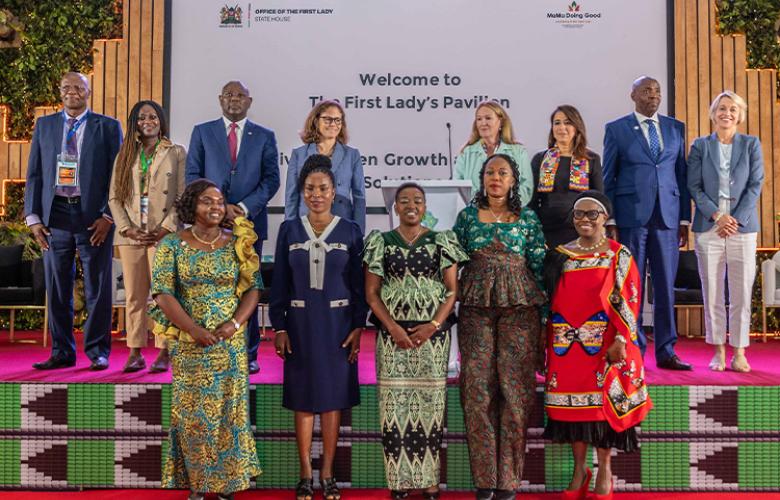
This September, the African Union and the Government of Kenya co-hosted the inaugural Africa Climate Summit, an important moment of focus for African nations and global leaders to discuss sustainable solutions to climate challenges.
As part of the summit and tied to the Our World, Our Work initiative, EDC joined African leaders, including first ladies and climate-engaged youth, in “The Big Opportunity,” a high-level discussion panel hosted by First Lady of Kenya Mama Rachel Ruto and moderated by EDC President and CEO Liesbet Steer.
The event discussed the escalating impacts of climate change alongside continued technological disruption, and the need for investments and action in light of the resulting economic impact we now face—one that has already begun to transform work for future generations. Following are highlights and insights shared at the session.
Africa’s Role in the Green and Blue Economy
As the continent with the largest youth population, Africa is flourishing with human resources, yet it experiences some of the most severe impacts of climate change, making the continent ideally positioned to lead a global response on climate adaptation and transformation. We know from our work and partnerships with various African nations that the talent and potential embodied within the youth population are immense.
Many African institutions have already recognized the significance of the opportunity afforded by the green transition and the centrality of its people in seizing it, and they have stepped up efforts in research and data, policy commitments and frameworks, and new financing mechanisms.
Investing in Education and Youth
Even with the progress and potential, significant investment and action is needed—specifically in education and the skilling or re-skilling of the youth workforce. And this gap in education isn’t unique to Africa. Without the development of quality education and skills training systems, especially for youth, countries won’t be able to effectively seize economic and employment opportunities created by the green transition once they’re available.
“Education without a doubt will serve to unlock opportunities within the green economy.”
— First Lady of Kenya, Mama Rachel Ruto
We must drive investments in education around the world, for three reasons:
1. Education helps build awareness of our climate reality. Some estimate that about one-third of emissions reductions will be dependent on individual behavioral change. This change requires a climate literate global population, yet only a few countries have formally integrated climate literacy in their curricula.
2. Education is the best investment in adaptation. Education is strongly connected to a person’s ability to adapt to changing circumstances—something that will be crucial for society as the effects of climate change intensify. But populations most vulnerable to climate change today are often those with the least access to education, the majority of whom are women and girls.
3. Education provides people with the skills to participate in the future economy. New climate-adapted economies will require transformative green skills, new forms of leadership and ability to adapt to rapidly changing markets, and the re-skilling of those in impacted industries. Education can help deliver both justice and equity, ensuring that youth have access to leadership roles that can accelerate a just transition to green economies. Yet fewer than 40 percent of nationally determined contributions (NDCs) reference skills training, and 1-in-5 NDCs have no plans for training or capacity development at all.
A Global Call-to-Action
“We must bring together youth, leaders and change-makers from all roles and walks of life to capture the win-win solution of education, climate change, adaptation, mitigation, and job creation. We need a global focus on the transformation of education systems.”
— EDC President and CEO Liesbet Steer
We believe that this decade—this moment—is the time in which all nations, in Africa and beyond, must take action on climate change, acting collectively to address these impacts by driving green growth solutions.
Our call-to-action is a call for a new narrative, one that closes the gaps to workforce opportunities and politically champions the transformation of education and skills development, equipping youth with the skills necessary to thrive as our world continues to change.
Learn more about what we’re doing and stay connected for updates at edc.org/owow.
| Melanie Sany is director of International Youth Programs at EDC, overseeing large-scale workforce and livelihood development projects that provide youth with the skills and services they need to succeed in the marketplace. |

Add new comment